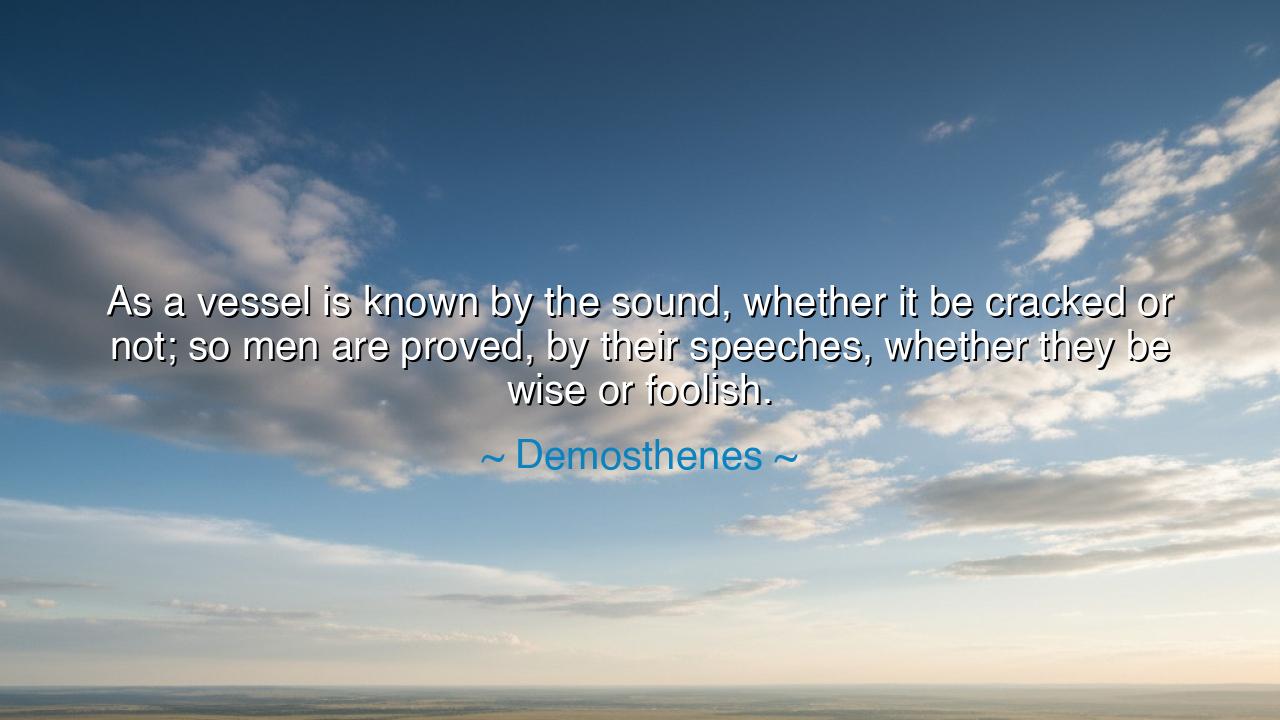
As a vessel is known by the sound, whether it be cracked or not;
As a vessel is known by the sound, whether it be cracked or not; so men are proved, by their speeches, whether they be wise or foolish.






Hear the voice of Demosthenes, the great orator of Athens, who declared: “As a vessel is known by the sound, whether it be cracked or not; so men are proved, by their speeches, whether they be wise or foolish.” In this image, both simple and profound, he reveals the truth that words are the echo of the soul. Just as a pot or jar, when struck, betrays its strength or weakness in the sound it makes, so too does the speech of a man reveal the condition of his mind and heart. This is no small matter, for the ancients knew well: kingdoms rise and fall by words, and the destiny of men is often sealed by the tongue.
The origin of this wisdom lies in the life of Demosthenes himself, who was no stranger to the power of speech. Born with a weak voice and a stammer, he trained tirelessly, filling his mouth with pebbles to strengthen his tongue, shouting against the roar of the sea to sharpen his lungs. In time, he rose to become the greatest speaker of Athens, one whose words moved crowds, stirred nations, and defied kings. He knew better than most that a man’s voice is not a mere noise—it is a revelation of his soul’s integrity. A cracked vessel cannot hide its flaw; a foolish speech cannot disguise a shallow mind.
The vessel is an ancient symbol, used by poets and philosophers to describe human character. A vessel may be adorned with paint or gilded in gold, yet if its substance is weak, its sound betrays it. So too with men: they may dress in fine robes, sit upon thrones, or wield authority, but when they open their mouths, the truth is revealed. The wise man speaks with clarity, moderation, and depth, while the foolish man betrays his ignorance with rash words, empty boasting, or deceit. Thus, speech is the test that no man can escape.
History gives us endless examples. Consider Pericles, whose orations during the Peloponnesian War gave hope to Athens even in times of plague and strife. His words were vessels of wisdom, filling his people with courage and vision. By contrast, recall Alcibiades, whose reckless speech and flamboyant promises seduced Athens into disastrous expeditions. His voice rang loud, but the sound was hollow, like a cracked vessel. The fate of Athens itself bore witness to Demosthenes’ truth: the strength of a man’s speech is the strength of his soul.
The meaning of this quote is not only political, but personal. In daily life, we are tested by our own speeches—not only in grand oratory, but in the common words we use with friends, family, and strangers. A single sentence may reveal patience or temper, wisdom or folly, kindness or cruelty. Just as a jar cannot choose the sound it makes when struck, so our tongues cannot long disguise what dwells in the heart. Therefore, we must guard not only what we think, but what we speak, for our words are the public measure of our souls.
The lesson is clear: if you would be known as wise, then discipline your tongue as well as your mind. Do not rush into speech, but let your words be weighed as gold. Avoid empty chatter and careless boasting, for these mark the vessel as cracked. Speak with honesty, clarity, and restraint, and others will hear in your voice the soundness of your spirit. For wisdom is not proved in silence alone, but in the careful music of words rightly spoken.
Practical actions follow. Listen to your own speech, and ask: does it reveal calmness or agitation, depth or shallowness, truth or deceit? Practice silence when tempted to speak in anger, for silence is the shield of the wise. Read the words of great thinkers, that your own tongue may echo their harmony. And when you do speak, speak with purpose—whether to comfort, to teach, or to inspire. Thus, your vessel will ring true, and others will know that within you lies strength unbroken.
So let Demosthenes’ words endure: as the vessel is tested by its sound, so are men tested by their speech. Do not fear this test, but prepare for it. Let your words be steady as iron, gentle as rain, clear as light. For in the end, long after robes have faded and crowns have rusted, the memory of a man is carried in the sound of his voice, whether it rang with wisdom, or broke upon the air in the hollowness of folly.






AAdministratorAdministrator
Welcome, honored guests. Please leave a comment, we will respond soon